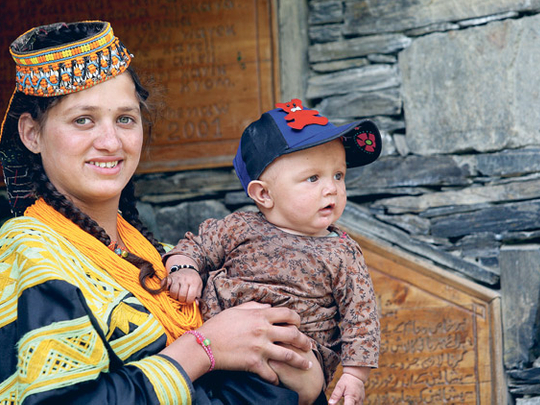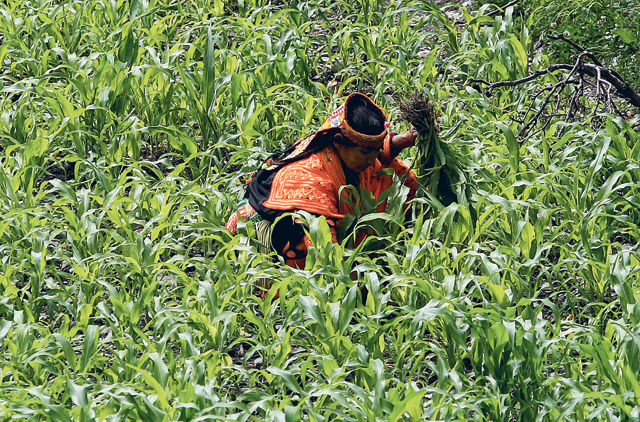
Lives of the Kalash revolve around their festivals which also form a major part of their religion.
Visiting the Kalash during one of their festivals offers a rare opportunity to experience the colourful and unique dances, rituals and customs.
The Kalash are fond of music and dance and they have a unique dance for every festival and event.
Though the Kalash do not miss any possible opportunity to perform their rituals, dances, songs and sacrifices, there are four major festivals in four seasons — spring, summer, autumn and winter. Visitors are welcomed at the festivals and encouraged to enjoy the unique Kalash culture.
Wine flows freely during all these events. It is probably the only area in Pakistan where brewing of wine in houses is allowed. The Kalash believe that if grapes are sacred fruit so is the wine made from them.
For the Kalash, singing and dancing is not just a source of entertainment but part of their religion. Music is part of their existence. Men and women, young and old, elite and commoners all get together to sing and dance.
Here are glimpses of some of the major festivals:
Joshi/Chilimjusht (spring festival)
Chilimjusht, held in the middle of May with the advent of the Spring season, is the most colourful of the festivals. It spans four days and is the best time for tourists to visit.
The spring festival is organised not only to bid farewell to the harsh winter season and welcome spring, but it also honours fairies and safeguards goats and shepherds before they go to the pastures. As girls pick the first flower of the season, the days are spent dancing, visiting each other, exchanging flowers, milk and milk products.
Before the festival, the women and girls from all over the valley decorate their houses. Local wine and milk products are shared. The women then sprinkle milk on the deity ‘Jestak' (the protector of their children and homes). The festival begins at Rumbur valley where tribal chiefs lead a procession to the ‘Malosh altar' and sacrifice goats. Later, the festival moves on to the largest valley Bumburet and winds up in the smallest valley Birir.
Every religious ceremony is accompanied by dancing and rhythmical chants to the beat of a drum. The women dance in a circle wearing traditional black robes, ornate cowrie shell headdresses and colourful necklaces. The men join in, one hand held round the waist of the partner and the other around the shoulders. Tribal chiefs in colourful clothes narrate stories of bygone days and events.
Utchal (summer festival)
Utchal celebrates the harvest season when wheat and barley crops are harvested and cheese is brought from the pastures in the mountains. The celebration lasts for two days with dancing, singing, and feasting. A lot of wine is drunk.
It also marks the culmination of Ranat — a two-month-long event during which young girls and boys dance on alternate nights in order to safeguard their crops.
Phoo (wine festival)
The Phoo is held at the end of September to celebrate the grape and walnut harvest. Grapes are picked throughout the valley on a particular day and it is an occasion for merry-making. Shepherds returning from the higher pastures as the winter sets in are also welcomed. Wine is consumed on every occasion, be it death, marriage, childbirth or even a simple gathering. It is also offered to visitors.
Chawmos (winter festival)
The Chawmos is held in the middle of December when the Kalash welcome the new year and pray for their well-being and that of their goats. During the harsh winter, the valleys are covered with heavy snow and the Kalash confine themselves to their houses. They also purify their houses, villages and valleys to protect them from any unforeseen disaster during winter.
Most of the winter festivities are held indoors. A lot of wine is drunk as the dancing continues till late in the night around a bonfire.
Tribal elders sit on hilltops at dawn to watch the rising sun and declare the new year. Goat sacrifices are then made to the deity Jastak and the blood from the animal is sprinkled at her temple.
This is the time of the year that the Kalash believe Balimine, another deity, visits the valleys. Sacrifices are also made at his malosh or altar.
This festival is rarely witnessed by visitors because it is next to impossible to access these valleys due to the roads being blocked by heavy snow.
Jastak han (sacred dance arena)
The Jastak han is a 40-feet-long and 20-feet-wide room used as a dance arena by the Kalash. It is also called ‘religious house'. It has various effigies and carvings on the doors and walls. It is the responsibility of the whole village to maintain Jastak han.
Widowers
It is not less than a curse to be a widower in Kalash society. A man, whose wife dies, has to spend at least five months in mourning and is secluded from the society. His head and face are shaved as soon as his wife dies and he is not allowed to shave or trim his hair during the five-month mourning period.
He is also not allowed to use water except for drinking. No one exchanges pleasantries with him and he is not allowed to share a meal with others. All the items of his daily use including his glass, plate, ‘charpai' (traditional bed) are isolated. He is also not allowed to touch anything or talk to anyone during the mourning period. He cannot share his pain with anyone because he has to bear the loss all by himself. He is also not allowed to smell a flower or touch a fruit.
A goat is sacrificed after the mourning period and the blood is poured on his head. The meat of the goat is not eaten. After this ceremony, the man is considered purified and is allowed to live a normal life.
Widows
If a woman loses her husband, she is considered an ‘untouchable'. Her mourning period is three months. During mourning, she is not allowed to speak to anyone. Her utensils are isolated and she has to eat and sleep alone in a designated corner of the house. She cannot wash or comb her hair. No one in the community talks to her.
Different rituals are performed to purify her during the mourning period. She has to live in her husband's house for three months and is not allowed to visit her parents' house. A goat is sacrificed at the end of the mourning period.
After the mourning period, the widow has to make a decision on whether she wants to live as a widow in her deceased husband's house or go to her parents' house or get married again. She is appreciated and given respect if she decides to stay at her husband's house. But if she decides to go back to her parents, she has to return all the items/goods given to her parents at the time of her marriage. If she and her parents cannot afford to return those items, the community contributes to help her do so.
Learn Kalasha
- Greetings/hello Ishpata
- Good morning Abujie (Abujiah)
- How are you? Tu Khen` aas (Tukians)
- I am fine. A prus`t` aam (a prushat aam)
- Where are you going? Tu kaway paris day (tu kawai pris dai)
- I am gong to Kalash. A Kalash parimday (Aa Kalash parim dai)
- What are you doing? Tu kia karisday (tu kia karis dai)
- Welcome On`jaa
- See you gheri pashik (gheripashk)
- Mountain Den`ta













